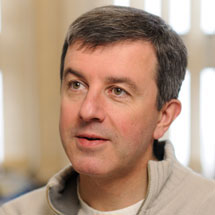 John Sutherland, from the LMB’s Protein and Nucleic Acid Chemistry Division, has been awarded the Royal Society’s Darwin Medal. John receives the medal “in recognition of his novel and convincing work on prebiotic chemistry, in particular his solution to the central problem of nucleoside synthesis”.
John Sutherland, from the LMB’s Protein and Nucleic Acid Chemistry Division, has been awarded the Royal Society’s Darwin Medal. John receives the medal “in recognition of his novel and convincing work on prebiotic chemistry, in particular his solution to the central problem of nucleoside synthesis”.
The Darwin Medal is awarded biennially for “work of acknowledged distinction in the broad area of biology in which Charles Darwin worked, notably in evolution, population biology, organismal biology and biological diversity.” The medal was created in memory of Charles Darwin and was first awarded in 1890. Previous winners who also made contributions to origins of life research include JBS Haldane.
John’s group is interested in how the chemicals necessary for life were synthesised on the early ‘prebiotic’ Earth. These include molecules for carrying information, catalysis and compartmentalisation – DNA/RNA, proteins and lipids respectively in the modern world.
Previous theories on the origins of life-forming molecules have assumed that one type of subsystem emerged first (e.g. the ‘RNA world’) and others followed. However, John’s group has discovered a set of reaction conditions (UV light and the reducing power of hydrogen sulphide) which are not only plausible early-Earth conditions, but also convert hydrogen cyanide and a couple of other small prebiotic molecules into nucleic acid, peptide and lipid building blocks.
John’s group is now working on ways in which these building blocks could assemble into the larger macromolecules needed for the emergence of life.
Further references:
John Sutherland’s group leader page
The Royal Society Darwin Medal